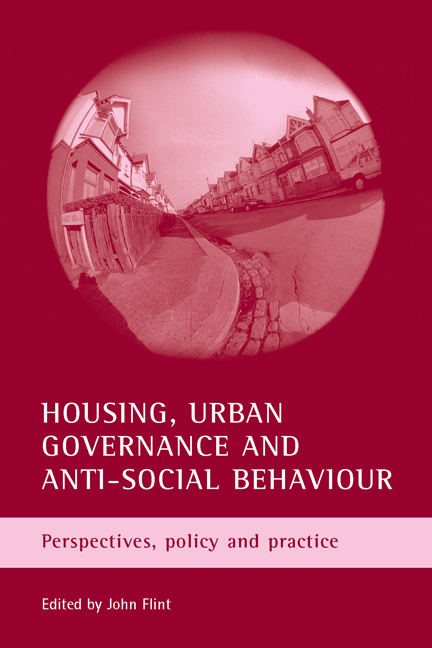Book contents
- Frontmatter
- Contents
- List of tables, figures and photographs
- Acknowledgements
- Notes on contributors
- Introduction
- Part 1 The definition and construction of anti-social behaviour in the UK
- Part 2 Legal techniques and measures utilised by social landlords to address anti-social behaviour
- Part 3 The emerging mechanisms of addressing anti-social behaviour in housing governance
- Part 4 Studies of housing and anti-social behaviour from an international perspective
- Index
four - Anti-social behaviour: voices from the front line
Published online by Cambridge University Press: 15 January 2022
- Frontmatter
- Contents
- List of tables, figures and photographs
- Acknowledgements
- Notes on contributors
- Introduction
- Part 1 The definition and construction of anti-social behaviour in the UK
- Part 2 Legal techniques and measures utilised by social landlords to address anti-social behaviour
- Part 3 The emerging mechanisms of addressing anti-social behaviour in housing governance
- Part 4 Studies of housing and anti-social behaviour from an international perspective
- Index
Summary
Introduction
Politicians and the media share a growing concern with anti-social behaviour (ASB), which is presented as a plaguing, degenerative and urgent problem that must be tackled if the government is to achieve its aim of tackling social exclusion and revitalising the most deprived neighbourhoods:
Anti-social behaviour blights people's lives, destroys families and ruins communities. It holds back the regeneration of our disadvantaged areas and creates the environment in which crime can take hold. (Home Office, 2003, p 2)
As the above extract from the 2003 White Paper Respect and Responsibility (Home Office, 2003) illustrates, much of the policy literature emanating from government is typified by the use of a vocabulary of irresponsibility and stigmatisation. Anti-social acts are described in emotive terms as ‘blighting lives’, ‘destroying families’, ‘shattering communities’, and those responsible for such behaviour are constructed as a dangerous minority who ruin the lives of the decent law-abiding majority. The way in which the problem is portrayed in the popular press is also characterised by the use of assertion and a demonising polemic. Particular target populations, for example, young people who are described as ‘feral’, ‘yobs’ and ‘louts’, and loneparent families who are deemed to be ‘dysfunctional’, are singled out as being responsible for ‘terrorising’ decent, hard-working citizens, and making life a misery for innocent people living in the same community.
The political and media rhetorical coverage of ASB shares an emotive narrative that persuasively suggests that punitive action is the only really effective way of controlling the behaviour of those who choose to behave in an anti-social manner. Such rhetoric has been described as populist and moralistic (Stephen and Squires, 2004), and there is a growing body of work critically exploring how the emerging governance of ASB has resulted in new forms of disciplinary social control which give rise to new forms of exclusion (Papps, 1998; Haworth and Manzi, 1999; Cowan et al, 2001; Hunter and Nixon, 2001; Flint, 2002; Jacobs et al, 2003; Brown, 2004; Stephen and Squires, 2004; Gillies, 2005).
In this chapter we explore the impact of political and media constructions of ASB on the private discourse of individuals living in hard-pressed areas where ASB is considered to be a big or fairly big problem (Wood, 2004). This chapter stems from our recent study (Hunter et al, 2004) examining the barriers that deter people affected by ASB from acting as witnesses in civil/criminal proceedings.
- Type
- Chapter
- Information
- Housing, Urban Governance and Anti-Social BehaviourPerspectives, Policy and Practice, pp. 79 - 98Publisher: Bristol University PressPrint publication year: 2006
- 1
- Cited by



